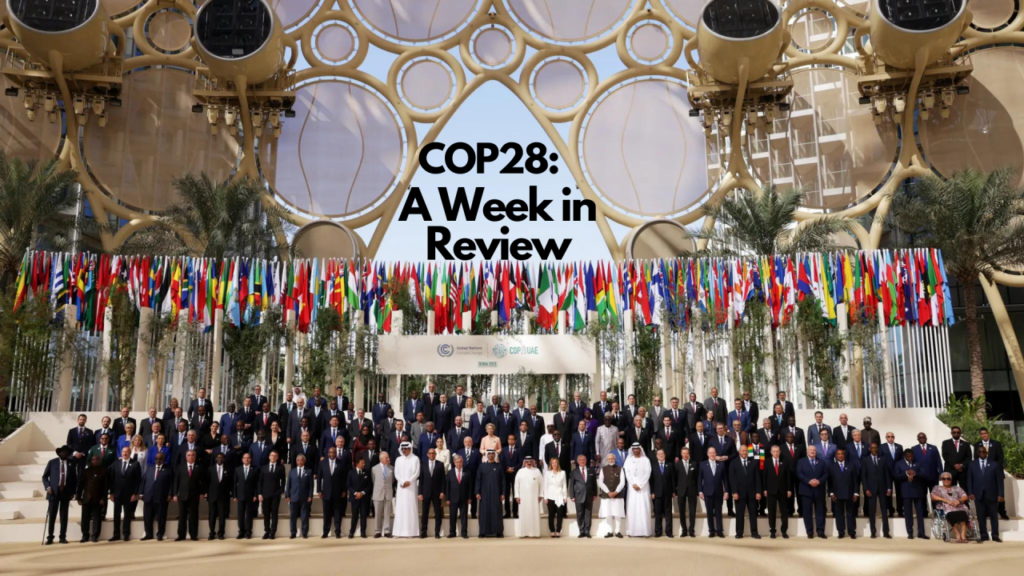Tim Mohin: COP28 – A Week in Review

|
Listen to this story:
|
Are COPs the most efficient means to manage the global climate crisis? No.
But, it is the process we have. And, with close to 200 countries representing eight billion souls, agreements are hard won. In this light, the record of COPs is actually remarkable. Having just spent several days in the hallways and meeting rooms of this year’s edition, I can say there is a concerted effort to move forward with new agreements.
We must move faster on climate action, and the question that gnaws each year is how can all sides express their views without producing enmity that blocks progress.
This week brought the typical arguments and counterpoints that can deflate the momentum toward progress. Rather than report on the rhetoric, we will focus our coverage on the reality of the actual accomplishments. Here are my five takeaways from an eventful first week:
- Climate Finance: COP28 has unlocked new funding for climate action. Hosts UAE claim there was over $80 billion of pledges in the first five days. Funding has been promised for climate-related issues around health, technology, and much more. This Reuters article gives a good rundown of the funds pledged in the first few days. The biggest single announcement was the $30 billion ‘Alterra’ fund, which aims to spur $250 billion of financing for climate initiatives in developing nations by 2030. Not surprisingly, funding remains a sticking point and trust is low after previous years’ finance pledges have not materialized.
- Decarbonizing Food: Global food systems are one of the biggest contributors to climate change (~34% of global emissions) and one of the most affected by a changing climate. The Declaration on Sustainable Agriculture, Resilient Food Systems, and Climate Action, signed by over 130 countries, will scale up agricultural adaptation, improve food security, and offer farmers assistance to maximize climate and environmental benefits.
- Kerry Supports ‘Some Phasing Out’: US climate envoy John Kerry told a group of journalists, “If you’re going to reduce the emissions, and you’re going to actually hit the target of net zero by 2050, you have to do some phasing out.”
The COP28 final draft text has three options for fossil fuels. The first option is “an orderly and just phase-out of fossil fuels.” The second option calls for “accelerating efforts towards phasing out unabated fossil fuels,” and the third option does not mention “phase-out.”
- Tripling of Renewable and Nuclear Energy: With a new report revealing global emissions from fossil fuels will be their highest ever in 2023, the need for investments in clean energy has never been higher. A group of 118 countries agreed to triple the capacity for renewable energy by 2030. A smaller group of 22 countries led by the US, signed a pledge to triple nuclear power by 2050 from 2020 levels.
- Methane Reduction: Methane has more than 80 times the warming potential than CO2, which is why mitigating methane can have a massive impact. A joint US and China methane summit added more countries to the methane pledge and pledged more funding for mitigation. Plus, over 50 oil and gas companies agreed to reduce their methane emissions to near zero by 2030.
These are just the highlights of agreements being forged at COP28. And, with an estimated 80,000 participants roaming the sprawling grounds, countless other agreements are being put together to accelerate climate progress.
Plugging US Methane Emissions

In support of the pledges made at COP28, the Biden administration announced a new US methane regulation this week. The new rule announced by EPA administrator Michael S. Regan at COP will make oil and gas companies detect and fix methane leaks beginning next year. The new rule is expected to save millions of tons of methane per year.
Environmental Defense Fund President Fred Krupp, said the policy was “the most impactful climate rule that the United States has ever adopted in terms of addressing temperatures we would otherwise see.”
Hidden in the language of this rule is an increase in the social cost of carbon – the economic impact of one ton of carbon dioxide released into the atmosphere. The cost increased nearly four times from the current $51 to $190 per ton. The higher price tag will enable the government to greenlight more ambitious climate projects and policies. “This is an enormous victory — this rocks. It’s awesome!” exclaimed Michael Greenstone, the Obama-era economist credited with the “social cost” concept. He added, “It brings the U.S. government to the frontier of climate science and economics, after we had fallen behind.”
This new regulation has come just as the US announced it’s producing a record 13.2 million barrels of oil per day.
Saving the Voluntary Carbon Markets

Another focus of COP28 is rescuing a beleaguered voluntary carbon market (VCM). VCMs have had a tough year, with multiple allegations that carbon offsets were not achieving the reductions claimed.
US climate envoy John Kerry said that there’s a huge opportunity to create a credible market, but “fly-by-night operations… have done an injustice to everybody.”
To shore up confidence in these markets The International Organization of Securities Commissions (IOSCO) has proposed 21 safety measures to enhance the integrity and transparency of the VCM. The measures aim to reduce instances of fraud, double counting, and bring more credibility to the market.
In addition, a US State Department-led scheme, the Energy Transition Accelerator, will begin offering high-quality carbon credits.
Closing Out the Year of Interoperability

One of the highlights for ESG in 2023, has been the convergence of the global ESG reporting landscape. To close out the “year of interoperability,” the Global Reporting Initiative (GRI) and the European Financial Regulations Action Group (EFRAG), have signed a new memorandum of understanding, which commits the groups to further alignment.
One of the outcomes of the new agreement for cooperation was an “Interoperability Index,” which maps how the data points of each disclosure standard relate to each other.
Meanwhile, the International Sustainability Standards Board (ISSB) further solidified its adoption at COP28, with more than 70 institutional investors agreeing to support and use the ISSB standards. In addition, nearly 400 organizations from 64 jurisdictions also pledged support.
This Smart Read article is contributed by Tim Mohin, Global Sustainability Leader, BCG. Every week ESG News delivers smart commentary from ESG practitioners and experts to unpack issues of the week. Submit your ESG Smart Read to [email protected]









